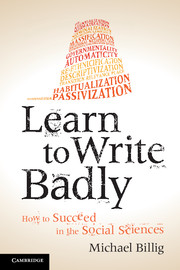Book contents
- Frontmatter
- Contents
- Acknowledgements
- 1 Introduction
- 2 Mass publication and academic life
- 3 Learning to write badly
- 4 Jargon, nouns and acronyms
- 5 Turning people into things
- 6 How to avoid saying who did it
- 7 Some sociological things: governmentality, cosmopolitanization and conversation analysis
- 8 Experimental social psychology: concealing and exaggerating
- 9 Conclusion and recommendations
- References
- Index
2 - Mass publication and academic life
Published online by Cambridge University Press: 05 June 2013
- Frontmatter
- Contents
- Acknowledgements
- 1 Introduction
- 2 Mass publication and academic life
- 3 Learning to write badly
- 4 Jargon, nouns and acronyms
- 5 Turning people into things
- 6 How to avoid saying who did it
- 7 Some sociological things: governmentality, cosmopolitanization and conversation analysis
- 8 Experimental social psychology: concealing and exaggerating
- 9 Conclusion and recommendations
- References
- Index
Summary
If we want to understand why academics today write as they do, then we should bear in mind one simple fact: in current times academics are writing and publishing as part of their paid employment. We will not get near to understanding what might be going wrong in the social sciences unless we accept this. By and large, academics today are not writing in answer to a higher calling or because they have dedicated themselves to the pursuit of truth. We are, to put it bluntly, hacks who write for a living. This is the unflattering reality from which we need to start.
Later, I will be examining what social scientists are writing and the styles that they consider normal to use. However, I am not going to start with the writing itself, but with the conditions of academic life today. By doing it that way round, it might be easier to resist some myths that will get in the way of understanding what is going on. Stanislav Andreski in Social Sciences as Sorcery (1971) argued that too many young persons were being educated to become academic social scientists, whereas, in his opinion, only a tiny minority possessed the talent to write well or to think originally. Because talent was being spread so thinly, the level of intellectual literacy was sinking disastrously. In my view, the problem does not lie in supposed talent, or lack of it, but it lies in the conditions in which we all are working. To listen to some critics, we might get the impression that all the faults of the social sciences are to be heaped at the door of continental philosophers. If only young social scientists could resist the pretentious nonsense that has been coming from French and German philosophers, then we would be able to get back to robust, empirically minded, good social scientific writing. Again, that is an over-simplification, for there are problems with the so-called robust, empirical way of writing.
- Type
- Chapter
- Information
- Learn to Write BadlyHow to Succeed in the Social Sciences, pp. 12 - 39Publisher: Cambridge University PressPrint publication year: 2013



